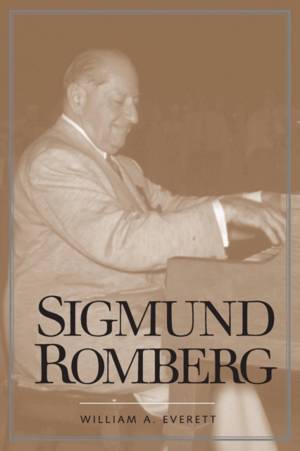
- Afhalen na 1 uur in een winkel met voorraad
- Gratis thuislevering in België vanaf € 30
- Ruim aanbod met 7 miljoen producten
- Afhalen na 1 uur in een winkel met voorraad
- Gratis thuislevering in België vanaf € 30
- Ruim aanbod met 7 miljoen producten
Zoeken
Omschrijving
Hungarian-born composer Sigmund Romberg (1887-1951) arrived in America in 1909 and within eight years had achieved his first hit musical on Broadway. This early success was soon followed by others, and in the 1920s his popularity in musical theater was unsurpassed. In this book, William Everett offers the first detailed study of the gifted operetta composer, examining Romberg's key works and musical accomplishments and demonstrating his lasting importance in the history of American musicals.
Romberg composed nearly sixty works for musical theater as well as music for revues, for musical comedies, and, later in life, for Hollywood films. Everett shows how Romberg was a defining figure of American operetta in the 1910s and 1920s (Maytime, Blossom Time, The Student Prince), traces the new model for operetta that he developed with Oscar Hammerstein II in the late 1920s (The Desert Song, The New Moon), and looks at his reworked style of the 1940s (Up in Central Park). This book offers an illuminating look at Romberg's Broadway career and legacy.
Romberg composed nearly sixty works for musical theater as well as music for revues, for musical comedies, and, later in life, for Hollywood films. Everett shows how Romberg was a defining figure of American operetta in the 1910s and 1920s (Maytime, Blossom Time, The Student Prince), traces the new model for operetta that he developed with Oscar Hammerstein II in the late 1920s (The Desert Song, The New Moon), and looks at his reworked style of the 1940s (Up in Central Park). This book offers an illuminating look at Romberg's Broadway career and legacy.
Specificaties
Betrokkenen
- Auteur(s):
- Uitgeverij:
Inhoud
- Aantal bladzijden:
- 384
- Taal:
- Engels
- Reeks:
Eigenschappen
- Productcode (EAN):
- 9780300217629
- Verschijningsdatum:
- 16/06/2015
- Uitvoering:
- Paperback
- Formaat:
- Trade paperback (VS)
- Afmetingen:
- 156 mm x 234 mm
- Gewicht:
- 589 g

Alleen bij Standaard Boekhandel
+ 162 punten op je klantenkaart van Standaard Boekhandel
Beoordelingen
We publiceren alleen reviews die voldoen aan de voorwaarden voor reviews. Bekijk onze voorwaarden voor reviews.








